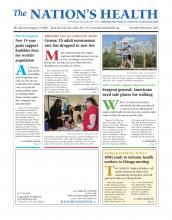A new report finds that many Americans will receive a medical diagnosis error at some point in their lives but health workers can play a role in reducing mistakes.
Delayed or inaccurate diagnoses affect 5 percent of Americans receiving outpatient care annually, according to “Improving Diagnosis in Health Care,” a report released in September by the Institute of Medicine of the National Academies of Sciences, Engineering and Medicine.
The errors are linked to approximately 10 percent of patient deaths based on decades of research, as well as 6 to 17 percent of “adverse events in hospitals,” the report said. The report also cited a 2014 study in BMJ: Quality and Safety that found approximately 12 million adults each year deal with a diagnostic error. A diagnostic error is defined as either failing to deliver a timely and accurate report of what makes a patient sick or falling short in informing patients about what ails them.
Diagnosing a patient is a team effort of multiple health care professionals and not the sole responsibility of one doctor, according to John Ball, MD, JD, chair of the committee that wrote the report, in a Sept. 22 news release. Some reasons behind why errors persist are a lack of transparency about mistakes and health professionals’ failure to keep communication lines open with fellow workers and patients, the report said.
“The stereotype of a single physician contemplating a patient case and discerning a diagnosis is not always accurate and a diagnostic error is not always due to human error,” said Ball, who is also executive vice president emeritus of the American College of Physicians. “Therefore, to make the changes necessary to reduce diagnostic errors in our health care system, we have to look more broadly at improving the entire process of how a diagnosis made.”
The current process usually begins with someone seeking care for a health issue, followed by a team of health care professionals gathering information about a patient through tasks such as a physical exam. They then interpret that information to create a working diagnosis, the report said. From there, health care professionals inform a patient of her or his diagnosis and treatment begins.
The report suggests eight ways health workers can reduce errors and improve the way diagnoses are made. Recommendations include implementing a liability system for health care workers to learn from their mistakes and creating training opportunities for health care workers about the diagnostic process. Another important step is making sure patients are a part of the process of diagnosis, the report said.
“One strategy is to promote the use of health information technology tools that make a patient’s health information more accessible…Involving patients and their families in efforts to improve diagnosis is also critical, because they have unique insights into the diagnostic process and the occurrence of diagnostic errors,” the report authors wrote.
For more information, visit https://iom.nationalacademies.org/Reports/2015/Improving-Diagnosis-in-Healthcare.aspx.
- Copyright The Nation’s Health, American Public Health Association









